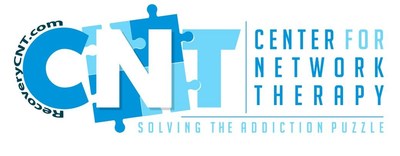Most people deem physician-prescribed medication safe and use it to alleviate their travel-related anxiety
|
WEST ORANGE, N.J., July 16, 2019 /PRNewswire/ -- Anxiety afflicts over 10% of the general population in America, and travel-related anxiety impacts about 3% of travelers. "It is considered a disorder when individuals suffering from it are unable to cope and turn to prescription medication, alcohol or illicit drugs to function normally," commented Dr. Indra Cidambi, M.D., Addiction Expert and Medical Director at Center for Network Therapy (CNT).
"While everyone feels some stress while traveling, some people become dysfunctional from anxiety," said Dr. Cidambi. One-in-ten people suffer from some form of anxiety, and that is often exacerbated by fear of flying or travel generally. Social obligations and business needs call for mandatory travel. "Oftentimes individuals with acute anxiety soothe themselves through prescription medications. Other times it is alcohol or drugs," said Dr. Cidambi. "It is obvious that utilizing drugs or alcohol to deal with a stressor raises the risk of addiction, as life comes with many stressors. What is often overlooked is the potential for physician prescribed medications to be addictive." Short-acting benzodiazepines are usually prescribed to deal with travel-related anxiety. They, much like opiates, deliver a high by triggering a surge of dopamine, and are highly addictive. Most people deem physician-prescribed medication safe and use it to alleviate their travel-related anxiety. However, physicians usually prescribe a two-four week supply to give their patient some play room. This practice raises the risk of addiction, as the extra pills lying around provide a ready escape when the patient faces other life stressors. "Repeated use of benzodiazepines can lead to addiction, causing withdrawal symptoms when the patient tries to stop ingesting them. Also, benzodiazepines withdrawal can be dangerous as the patient could suffer from seizure or stroke," explained Dr. Cidambi. So, what other strategies can people suffering from travel-related anxiety utilize? "Making a list of stressors that causes a person acute anxiety and coming up with a strategy to address them individually usually works well," said Dr. Cidambi. "Planning is the most important element in reducing anxiety," she added. Studies have shown that 50% of travel-related anxiety relates to delays, as one has no control over the weather and other factors that could cause delays. "The best way to address this stressor is to build a slack day around a vacation or ensuring there are no critical deadlines to meet at work the day after return," said Dr. Cidambi. Another major travel-related stressor is fear of losing baggage. To guard against this spread clothing evenly between checked and hand baggage (instead of packing all underwear in hand baggage and all nice clothes in the checked baggage). "If planning does not alleviate anxiety, try therapy. Cognitive Behavioral Therapy (CBT) is highly effective in addressing anxiety. Medication should be last resort for anxiety, as it could lead to addiction," concluded Dr. Cidambi. About Dr. Cidambi About Center for Network Therapy (CNT)
SOURCE Center for Network Therapy |





